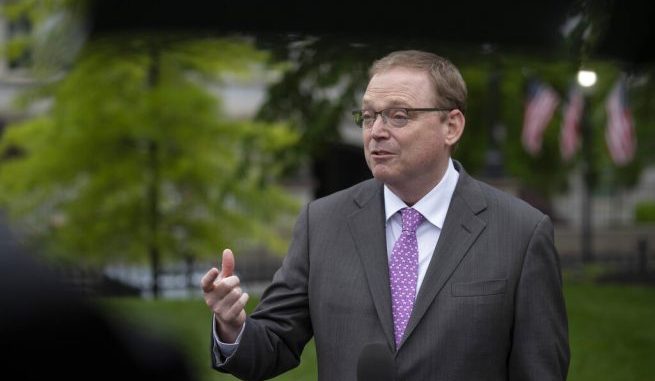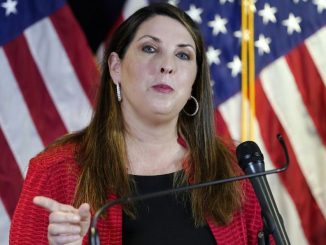

White House senior adviser Kevin Hassett speaks with reporters at the White House, Friday, May 22, 2020, in Washington. (AP Photo/Alex Brandon)
OAN Newsroom
UPDATED 10:37 AM PT — Sunday, May 24, 2020
Despite all 50 states and the District of Columbia bringing people back to work, the unemployment rate is still expected to rise from its current level of 14%.
On Sunday, senior White House economic adviser Kevin Hassett predicted June will see the unemployment rate surpass 20%.
“So my expectation is that, since there’s still initial claims for unemployment insurance in May, the unemployment rate will be higher in June. After that, it should start to trend down. So, I think we’re very, very close to an inflection point in terms of business activity and probably about a month away in terms of employment.” – Kevin Hassett, White House economic adviser
The month of May could see an unemployment rate north of 20%, according to Kevin Hassett, senior economic adviser to President Trump.
He adds that he expects “the unemployment rate will be higher in June than in May, but then after that it should start to trend down.” #CNNSOTU pic.twitter.com/KoAMyXRLef— State of the Union (@CNNSotu) May 24, 2020
According to the Bureau of Labor Statistics, 43 states are facing their highest ever unemployment rates. Their reports showed unemployment in Louisiana is currently worse than it was in 2005, when unemployment doubled after Hurricane Katrina.

FILE – In this March 13, 2020, file photo, unionized hospitality workers wait in line in a basement garage to apply for unemployment benefits at the Hospitality Training Academy in Los Angeles. (AP Photo/Marcio Jose Sanchez, File)
Across the country, the unemployment rate for teenagers spiked in April at 32%, the highest it has been since 1948. This number is expected to only get worse if usual summer jobs do not become available.
Despite this, Hassett reassured the data only looks back, not ahead.
“It’s going to be quite a bit higher,” he explained. “There were some technical things they kind of messed up, but it could be, if they fix the numbers, that you’ll end up with a number north of 20%.”
His remarks likely referred to reports from the Bureau of Labor and Statistics, which relied on a household survey to calculate the unemployment rate of each state. To be counted by the federal government, an unemployed worker must be actively seeking employment or be recently laid off.

FILE – In this May 7, 2020, file photo, a pedestrian walks by The Framing Gallery, closed due to the COVID-19 pandemic, in Grosse Pointe, Mich. (AP Photo/Paul Sancya, File)
Some states have changed their policies regarding unemployment benefits by dropping the job searching requirement.
Due to the pandemic, many workers are not actively looking for work. For those who are, the recent data showed the number of job openings has been steadily decreasing. Millions have also gone uncounted.
Moving forward, the Senate is set to debate the unemployment issue when they return from recess.







Be the first to comment